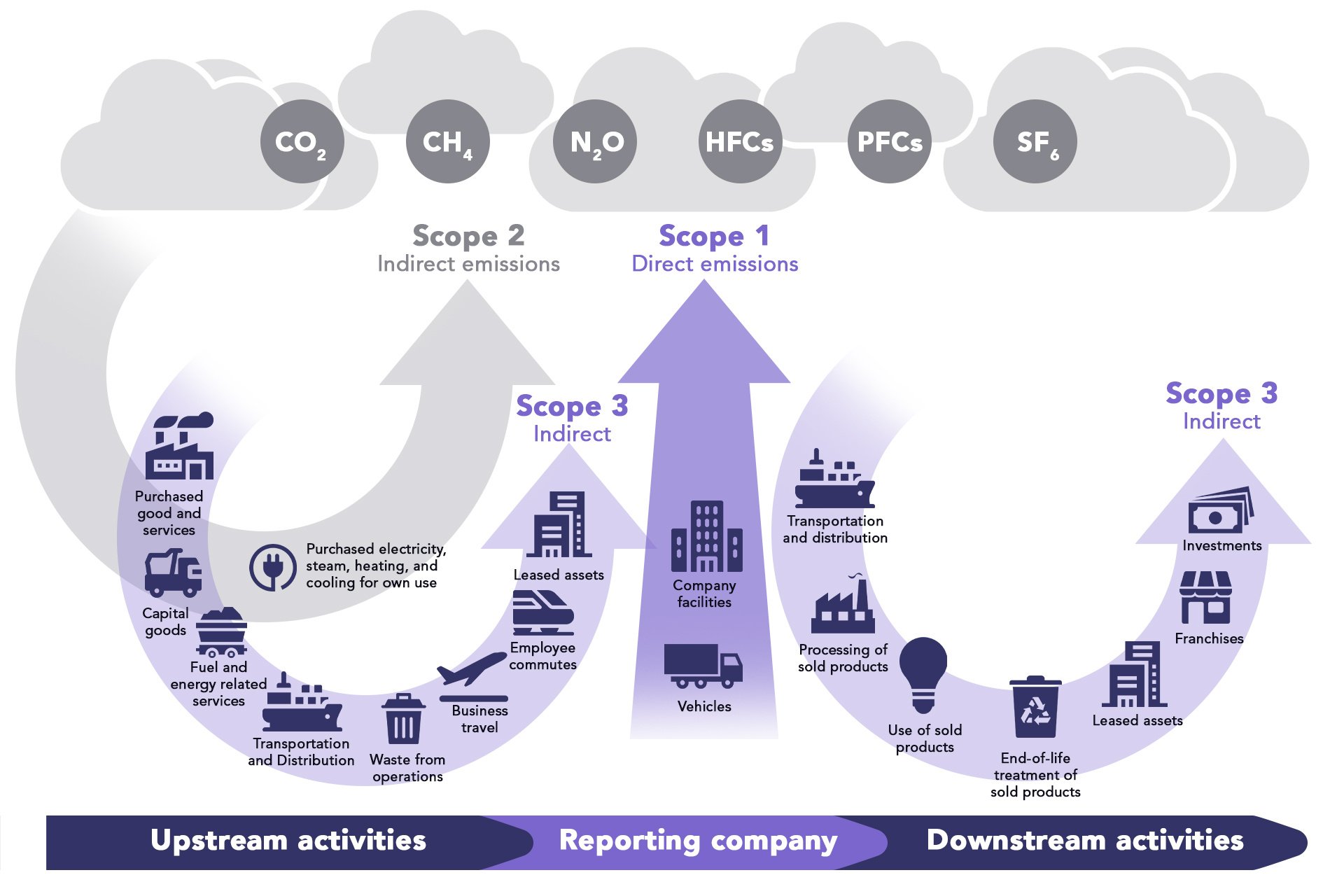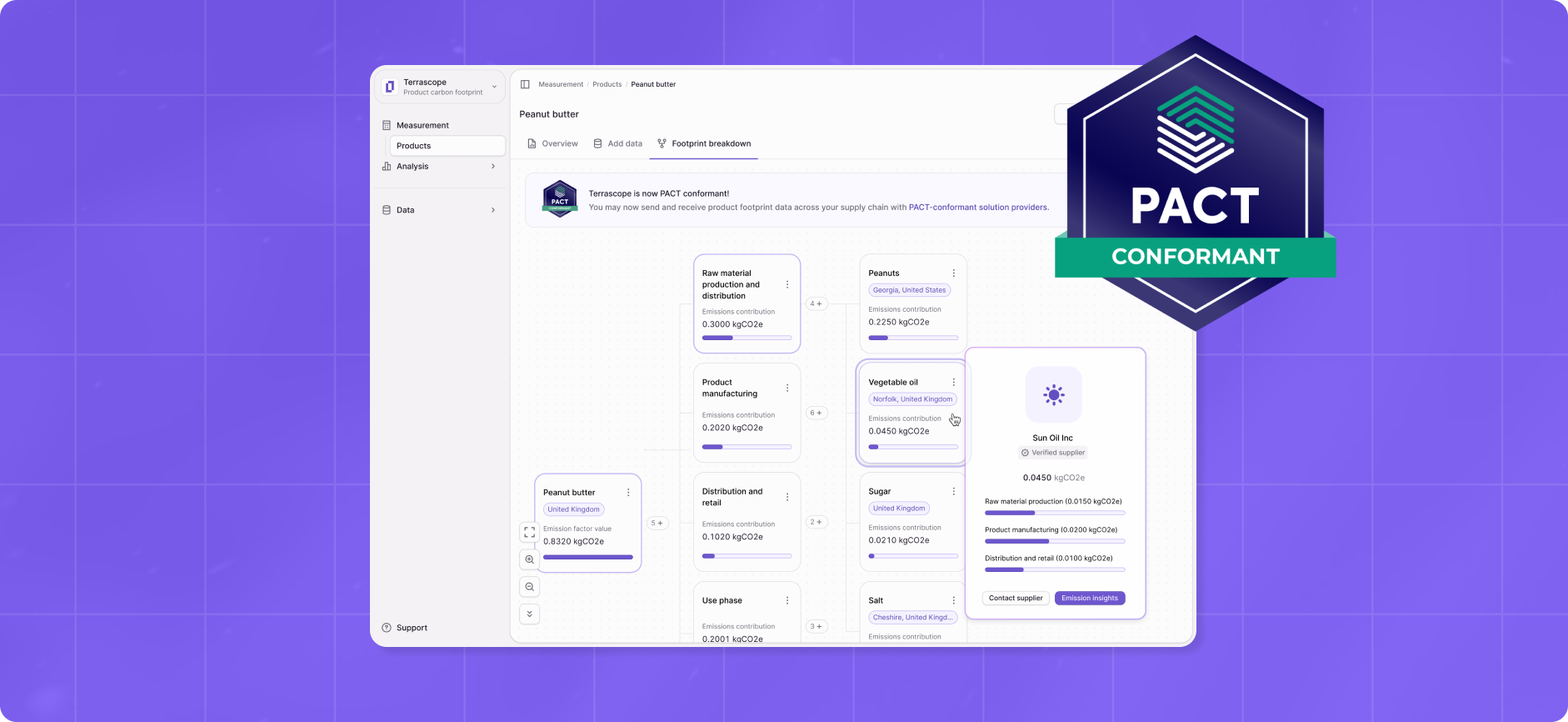Summary
- Scope 3 emissions represent the largest share of a company's carbon footprint, encompassing indirect emissions from the entire value chain, making them crucial yet challenging to manage effectively.
- Accurate measurement of Scope 3 emissions is vital for regulatory compliance, building brand trust, reducing financial risks, and uncovering opportunities for operational efficiency and sustainability advancements.
- Companies can enhance their supply chain resilience, access new markets, and attract investors by actively managing Scope 3 emissions, positioning themselves for long-term success in a sustainability-focused economy.
As the world grapples with the urgent need to address climate change, enterprises play a vital role in the reduction of greenhouse gas (GHG) emissions. These emissions can be placed into three categories:
- Scope 1 covers a company’s direct emissions, such as those from boilers and vehicles.
- Scope 2 covers indirect emissions such as purchased electricity.
- Scope 3, the largest and most complex category, includes emissions caused by a company’s suppliers and customers.

While many organisations focus on reducing their Scope 1 and Scope 2 emissions, which are generated from their operations and purchased energy consumption, Scope 3 emissions play a much more significant role in a company's carbon footprint. This is because Scope 3 emissions refer to those generated across an organisation's entire value chain, and can comprise a significant portion of their overall emissions. It is especially true for companies who do not manufacture products directly, and otherwise contribute GHGs through the activities of their employees or their value chain. Because these emissions are not always in direct control of organisations, Scope 3 emissions can be challenging, but ultimately rewarding to address. For one, Scope 3 emissions figures often comprise wider disclosures part of reporting frameworks like CDP and IR. By neglecting these emissions, businesses can miss out on significant opportunities to reduce their environmental impact and contribute to a sustainable future. Here’s why enterprises should consider investing in measuring and managing Scope 3 emissions.
The Business Benefits of Reducing Scope 3 Emissions
Companies stand to gain by managing their Scope 3 emissions, but the first step to tap into these benefits is by investing in emissions measurement and reporting. By focusing on accurate carbon measurement and management, businesses can gather granular data that can lead to actionable, sustainable change across operations. Businesses also benefit from reducing Scope 3 emissions in the following ways:
- Efficiency improvements: By focusing on Scope 3 emissions, organisations can identify emission hotspots in their value chain. This process often leads to improved resource and energy management, resulting in operational resilience. By optimising transportation, packaging, and logistics, companies can streamline operations, reduce waste, and enhance overall efficiency. As per an IDC report commissioned by Terrascope, we found that 29% of organisations surveyed could reduce waste and optimise costs just by supporting sustainability outcomes.
- Enhanced supply chain resilience and risk mitigation: By engaging and building stronger relationships with supply chain partners, businesses can inculcate sustainable procurement strategies that leverage technology to enhance capabilities. Collaborating with suppliers to improve their sustainability performance not only reduces emissions but also builds trust and resilience in the face of environmental challenges.
- Access to new markets and business opportunities: As investors and consumers gravitate towards brands with robust sustainability initiatives, businesses can align with customer expectations and preferences by reducing their Scope 3 emissions. Businesses that prioritise emission reduction can also gain a competitive edge and access to sustainability-focused markets. This shift in consumer demand opens up new avenues for growth and innovation.
- Improved investor relations and access to capital: Environmental, social, and governance (ESG) considerations are becoming increasingly important for investors. Companies that demonstrate a commitment to reducing Scope 3 emissions are more likely to attract investors interested in sustainable practices. By integrating sustainability practices into business strategies and across supply chains, enterprises can enhance their reputation, access capital, and align themselves for long-term financial success.
Understanding and Overcoming Challenges in Scope 3 Emission Reduction
While there are some significant challenges associated with measuring Scope 3 emissions, businesses can take various steps to overcome them. Terrascope supports businesses at every step of the decarbonisation journey through:
- Collaborative approaches with suppliers and partners: Organisations can establish clear sustainability expectations and collaborate with suppliers and partners to develop strategies for emissions reduction. Sharing knowledge and technology can help overcome barriers and achieve collective emission reduction goals. By working together, businesses can create a positive ripple effect throughout their value chain. For instance, Terrascope creates a guided visual workflow for suppliers to seamlessly submit the right data, in the right format, and gain insights into how the data will be used.
- Investing in technology and innovation: Adopting advanced data management and measuring platforms like Terrascope will help organisations facilitate the collection and analysis of Scope 3 emissions data with ease. Additionally, investing in research and development of sustainable alternatives and innovations can also help reduce emissions and create new business opportunities. Terrascope’s end-to-end decarbonisation platform empowers businesses to identify hotspots, track progress, and make data-driven decisions. Terrascope deploys advanced data processing methodologies and highlights gaps in data quality, comprehensiveness, and granularity across supply chains. Our platform capably identifies emissions hotspots by countries, business units, factories, or processes – with the highest emission contributions so that businesses can deliver the most impact in their decarbonisation actions.
- Engaging the right stakeholders: Raising awareness and fostering a sustainability-minded organisational culture is crucial for driving emission reduction efforts. By engaging employees and stakeholders through education, training, and incentives, businesses can harness their collective power and commitment to sustainability. Engaged employees can become champions for change, contributing ideas and initiatives that support emission reduction goals. Terrascope facilitates this by providing teams with emissions data dashboards relevant to their work, unlocking collaboration within organisations and with external partners to support data gathering, reduction initiatives, and progress tracking.
Conclusion
With climate change and global warming causing irreversible damage to the planet, addressing Scope 3 emissions is no longer a choice but a necessity for businesses committed to sustainability. By understanding the definition and significance of Scope 3 emissions, organisations can unlock numerous business benefits, including efficiency improvements, enhanced supply chain resilience, access to new markets, and improved investor relations. As the world transitions to a low-carbon economy, reducing Scope 3 emissions is critical for both the planet and the long-term resilience of businesses.



